 BY KATIE RUTH DAVIES
BY KATIE RUTH DAVIES

AGeorgian

 BY KATIE RUTH DAVIES
BY KATIE RUTH DAVIES

AGeorgian
 COMPILED BY ANA DUMBADZE
COMPILED BY ANA DUMBADZE
Russia’s defense ministry on Tuesday claimed it had “thwarted” an armed incursion by Ukrainian armed forces and “sabotage and reconnaissance groups” in its western border regions of Kursk and Belgorod.
Earlier, anti-Kremlin armed groups, purportedly made up of Russians opposed to the Ukraine war, said they had launched an incursion across Russia’s border.
Roman Starovoit, the governor of Russia’s Kursk region, which is on the border with Ukraine, said Tuesday that a “sabotage and reconnaissance group” had tried to break into the Kursk region but had failed.
Ukraine has not commented on the Russian defense ministry’s latest claim, although a Ukrainian military spokesman confirmed earlier that rebel groups were conducting an operation on Russian territory independently of Ukraine.
The Ukraine-based Freedom of Russia Legion and the Siberian Battalion announced on their Telegram pages that they had launched attacks into Russia from Ukraine. They said they intended to “take our land away from the [Putin] regime, centimeter by centimeter” and called on Russians to boycott the forthcoming presidential election.
A third Russian rebel group, the Russian Volunteer Corps, also appeared to confirm its participation in the operation on its Telegram account.
It is unconfirmed whether Ukraine’s armed forces were also involved in the incursion, as Russia suggested, as Russia tends to characterize all Russian rebel groups as “Ukrainian saboteurs.”
This is not the first time the groups have been active, with two of the proUkrainian Russian rebel groups launch-
ing raids into Russia’s Belgorod region last May and June.
THE WEEK’S DRONE ATTACKS
Ukraine pounded targets in Russia on Tuesday with dozens of drones and rockets in an attack that inflicted serious damage on a major oil refinery and sought to pierce the land borders of the world’s biggest nuclear power with armed proxies.
Russia and Ukraine have both used drones to strike critical infrastructure, military installations and troop concentrations in their more than two-year war, with Kyiv hitting Russian refineries and energy facilities in recent months.
Russia said Ukrainian proxies had sought to cross the Russian border in at least seven attacks that Russian forces had repelled. The Russian-speaking Ukrainian proxies said they had breached the border, a claim denied by Russia.
In one of the biggest Ukrainian drone attacks on Russia to date, Moscow said it downed 25 Ukrainian drones over the regions of Moscow, Leningrad, Belgorod, Kursk, Bryansk, Tula and Oryol. Waves of drone attacks continued through the day, the defense ministry said.
Russian officials reported attacks on energy facilities, including a fire at Lukoil’s NORSI refinery and a drone destroyed on the outskirts of the town of Kirishi, home to Russia’s second largest oil refinery.
Gleb Nikitin, governor of the Nizhny Novgorod region, posted a picture of a fire truck beside the NORSI refinery and said emergency services were working to put out a blaze there.
A Russian attack on Sumy Oblast on March 12 injured three people, including two children, the region’s administration reported.
Sumy Oblast authorities say Russian
Georgian documentary filmmaker Salome Jashi has won the Berlin Academy of Arts award.
Akademie der Künste, The Berlin Academy of Arts, annually awards prizes and scholarships for exceptional creative achievement and for the support and development of artists in six categories: visual arts, architecture, music, literature, performing arts, and film and media arts.
It is in the category of film and media art that Georgian director was named the winner.
Salomè Jashi is also the chairman of the Georgian Documentary Association Doka DOCA · Documentary Association Georgia and also a board member of filmmakers at Georgian Film Institute.
Salome Jashi is director of such internationally acclaimed films as: Taming the Garden, “The Dazzling Light of Sun-
forces launched two guided aerial bombs at the district of Velyka Pysarivka at 9.20am local time.
The attack reportedly injured two children, aged six and 10, and an adult. Five homes and a garage were also destroyed, The Kyiv Independent reported. Settlements in Ukraine’s northeastern Sumy Oblast suffer from daily Russian strikes due to their proximity to the border with Russia.
Russian troops launched a total of nine strikes against parts of Sumy Oblast on March 12, regional authorities reported. Over 96 explosions were recorded.
The Pentagon will rush about $300 million in weapons to Ukraine after finding some cost savings in its contracts, even though the military remains deeply overdrawn and needs at least $10 billion to replenish all the weapons it has pulled from its stocks to help Kyiv in its desperate fight against Russia, the White House announced Tuesday.
The announcement came as Ukraine is running dangerously low on munitions, and US efforts to get fresh funds for weapons have stalled because of Republican opposition. US officials have insisted for months that the United States wouldn’t be able to resume weapons deliveries until Congress provided the additional replenishment funds, which are part of the stalled supplemental spending bill.
“When Russian troops advance and its guns fire, Ukraine does not have enough ammunition to fire back,” said national security adviser Jake Sullivan when announcing the $300 million in additional aid.
One official said the package represented a “one time shot,” unless Congress passes the supplemental spending bill, which includes roughly $60 billion in military aid for Ukraine, or more cost savings are found. It is expected to include anti-aircraft missiles, artillery rounds and armor systems, the official said.
“This is not a sustainable way to support Ukraine,” said Maj. Gen. Pat Ryder, Pentagon press secretary, calling it a “one-time good deal” that officials can’t plan on occurring again.
FOLLOWING POPE'S COMMENTS, NATO CHIEF SAYS UKRAINE NEEDS WEAPONS, NOT 'WHITE FLAGS' NATO Secretary-General Jens Stoltenberg dismissed a call by Pope Francis for Ukraine to "raise the white flag and negotiate with Russia," saying the best way to end the conflict is to arm Kyiv.
"If we want a negotiated, peaceful, last-
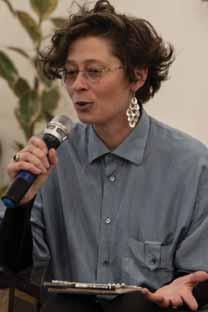
ing solution, and the way to get there is to provide military support to Ukraine," Stoltenberg said on March 11 in response to a Reuters question about the Catholic leader's comments.
“Our support to Ukraine saves lives, and it must continue. Putin started this war and he could end it today, but Ukraine does not have this option. Surrender is not peace. We must continue to strengthen Ukraine to show President Putin that he will not get what he wants on the battlefield, but must sit down and negotiate a solution where Ukraine is recognized and prevails as a sovereign, independent nation,” Stoltenberg said.
In a televised interview broadcast on March 10, the 87-year-old Pope Francis said Ukraine should have the "courage” to negotiate with Russia to save the lives of its own citizens. Tens of thousands of soldiers on both sides of the conflict have been killed since the February 2022 full-scale invasion.
"When you see that you are defeated, that things are not working out, you have to have the courage to negotiate," the Pope said.
Later, the Vatican said that "the first condition" for peace is that Russia "put an end to its aggression."
Cardinal Pietro Parolin, the Vatican's secretary of state and the pontiff's closest collaborator, told the Corriere della Sera daily on March 11 that "the Holy See pursues this line and continues to ask for a 'cease-fire', and the aggressors should be the ones who cease fire."
Ukraine has recovered much of the territory Russia initially seized following the initial attack in 2022. However, Ukraine's much-anticipated 2023 counteroffensive failed to make much progress, raising concerns the war had reached a stalemate.
Experts say that a negotiated settlement now would only benefit Russia, cementing its gains to date in Ukraine
and allowing it to reconstitute its forces for a future attack. They also say that Russian President Vladimir Putin has not given up hope of conquering all of Ukraine.
Pope Francis said in a February interview that Ukraine should have what he called "the courage of the white flag" and negotiate an end to the war with Russia. A representative of the Vatican clarified that the Pope’s statement was not a call for Ukraine to surrender.
The Ministry of Foreign Affairs of Ukraine summoned Visvaldas Kulbokas, Apostolic Nuncio to Ukraine, due to Pope Francis’ recent controversial statements about the Russo-Ukrainian war. Kulbokas was informed that Ukraine was "disappointed" by the Pope’s remarks about the "courage of the white flag" and the need to negotiate with Russia, Ukraine’s Foreign Ministry reported.
The ministry added that such claims "normalize the ‘might makes right’ mentality and encourage them [the aggressors] to further violate the norms of international law."
Kyiv expects the Pope to "send a message to the international community about the need to immediately join forces to guarantee the victory of good over evil, and to address the aggressor, not the victim," the ministry said in a statement.
The Apostolic Nuncio was separately reminded about the Ukrainian Peace Formula and Kyiv’s desire to achieve a just peace based on the principles of the UN Charter.
In response to Pope Francis’s statement, Polish Foreign Minister Radosław Sikorski said that the Pope should address Russian President Vladimir Putin and urge him to withdraw his occupation forces from Ukraine.
Ukraine’s Foreign Minister Dmytro Kuleba responded that Ukraine’s flag is not white, but yellow and blue.

Twenty-eightGeorgianwine companies participated in the ProWein Dusseldorf exhibition on March 10-12.
The National Wine Agency of Georgia reports that within the framework of the exhibition, four professional presentation-tastings of Georgian wine were held: At the prestigious German media holding’s Meininger stand, at the tasting ‘Georgia –The homeland of wine’ by Janek Schumann and Konstantin Baum, and at three events called ‘Georgian Wine Day’ hosted by Toni Askitis.
At the three-day event, wine professionals, representatives of the commercial sector and visitors were given the opportunity to evaluate Georgian wine, which is of particular importance for the growth of sales and recognition.
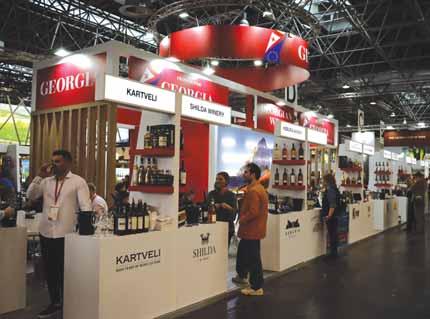
Continued from page 1
The launch event of the new project was held at Stamba Hotel on March 13, gathering representatives from various governmental, non-governmental and international organizations, as well as the private sector.
Sofia Janjua, the Country Director of PIN Georgia, opened the event with a welcome speech, underlining the project's importance and its capacity to bring about meaningful transformation. Mr. Catalin Gherman, Deputy Head of Cooperation at the Delegation of the European Union to Georgia, representatives of the Czech Development Agency, government officials, and delegates from FAO and the European Food Banks Federation (FEBA) contributed their perspectives, underscoring the significance of establishing Georgia's first Food Bank as a sustainable initiative for ensuring food security and addressing the challenges of food loss and waste prevention.
The EU-funded project, set to run from 2023 to 2026, will pilot a food bank initiative to address local food insecurity by redistributing unsold food items, and will test the impact of the new Law on Food Loss and Waste Reduction, Food Recovery and Redistribution. The initiative, which draws on PIN's and the Red Cross movement's global expertise in food security, waste management and climate change mitigation, also seeks to empower local civil society actors to facilitate the identification of food-insecure individuals, provide food to vulnerable populations, cooperation with local farmers, and run awareness campaigns on food waste and food losses.
The keynote speakers at the launch included Khatia Tsilosani, First Deputy
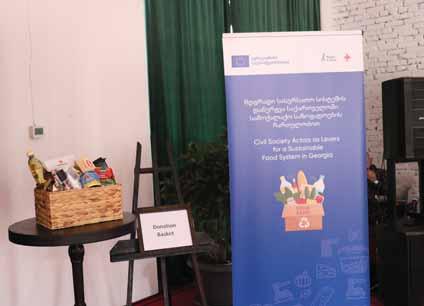
Chairperson of the Environmental Protection and Natural Resources Committee of the Georgian Parliament; Kakha Kakabadze, Deputy Minister of Environmental Protection and Agriculture; Jumber Maruashvili, Senior Policy Advisor at the Food and Agriculture Organization of the UN, and Balazs Cseh, European Food Banks Federation (FEBA).
Target groups include Food Business Operators (FBOs), such as supermarket retailers, distributors, and HORECA actors in Tskaltubo and Tbilisi; primary food producers (farmers) in Tskaltubo municipality and the surrounding areas; consumers and restaurant goers; food insecure people in Tskaltubo and the surrounding areas; government entities, including the Ministry of Environmental Protection and Agriculture (MEPA), National Food
Agency (NFA), Ministry of Finance (MoF), Revenue service, Agrarian Issues Committee; the Parliament of Georgia and Tskaltubo municipality; and the Food and Agriculture Organization of the United Nations (FAO).
GEORGIA TODAY spoke to project manager Sofia Tvaradze to find out more. First, we asked why Tskhaltubo was chosen for the food bank project.
“We identified Tskaltubo due to the critical issue of food insecurity faced by certain community members there, particularly low-income families, singleparent households, internally displaced people (IDPs) and the elderly,” she tells us. “To comprehensively address this issue, our project takes a two-pronged approach. We will collaborate with retailers and suppliers in Tbilisi to secure
donated food items, while also partnering with Tskaltubo's agricultural sector to incorporate fresh local produce. Ensuring access to nutritious options is a key priority. The project will focus on acquiring and distributing a balanced variety of food items to meet the specific dietary needs of the vulnerable population.”
We hope it will be replicated in other regions and municipalities of Georgia, depending on how successfully we manage to set-up the Food Bank operating mechanism.
The food bank intervention will redistribute unsold food items donated by food business operators, otherwise destined for landfills, to food insecure people in the municipality of Tskaltubo. This pilot intervention will test the impact of the new Law on Food Loss and Waste Reduction, Food Recovery and Redistribution expected to be approved later this year. The action will empower LAG [ed. Local Action Group] Tskaltubo and other local civil society actors, including registered CSOs and informal groups, to facilitate the provision of food to local food insecure people. This will include their involvement in the identification of food insecure people, distribution of food items from the food bank, their role in facilitating the cooperation of local farmers with surplus produce and the municipal soup kitchen, and an accompanying information campaign assuring people of the safety of donated food.
• Reduction in food waste and farm losses.gate
• Reduction in greenhouse gas emissions.
• Decrease in food insecurity among the local population.
Redistribution of unsold food items and surplus produce will result in a reduction of food waste and farm gate losses, leading to a reduction in greenhouse gas emissions, while at the same time reducing the rate of food insecurity among the local population.
Furthermore, the LAG and CSAs will be provided with training and resources to run awareness raising campaigns on the issue of food waste and food losses, leveraging their networks in the community to influence behavior change at the local level.
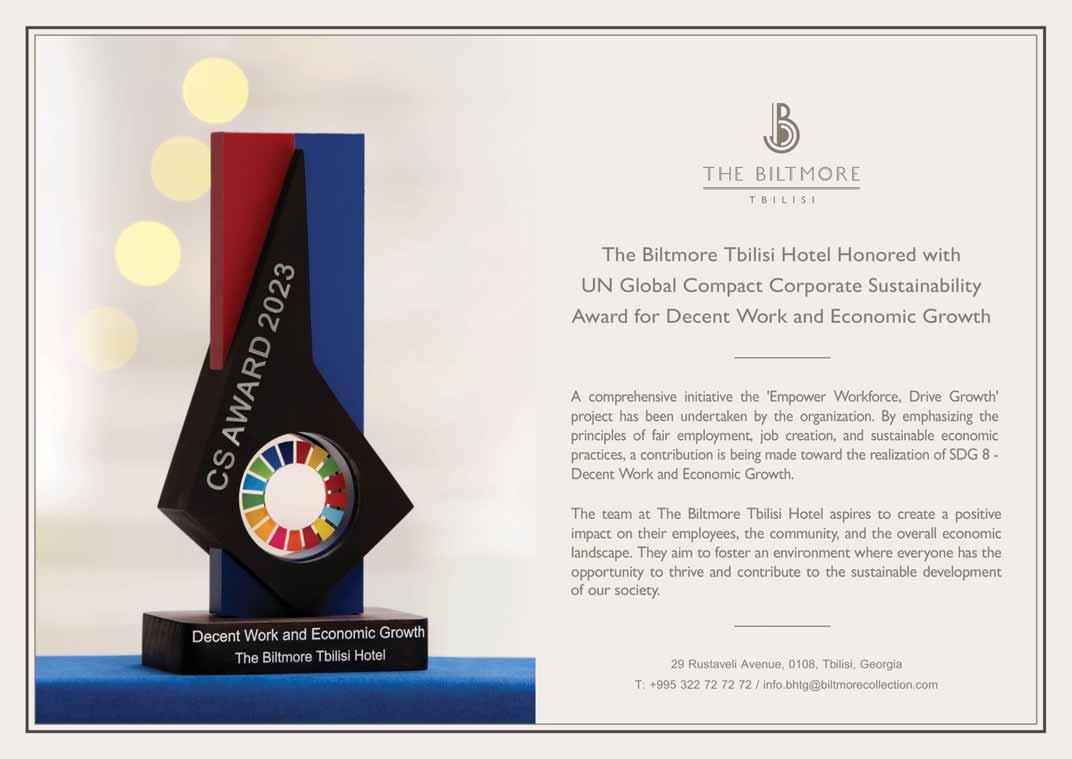

No matter how insecure we feel because of wars that destroy the environment and lower our standard of living, we still go for it as if we have nothing better to do in this beautiful world of ours. Source:
OP-ED BY NUGZAR B. RUHADZEThere is every proof out there that the world is becoming more violent than it has ever been before, and Mankind stupider than we have ever seen it in the past- this
Paul Watson/Toronto Starhappening in our time of the extremely elevated human sophistication, marked by an unwitnessed-before scientific boom and technological progress. Historically speaking, Man has always wanted to be violent; easily and vehemently killing fellow humans all over the planet, knowing no limits to those brutal attacks against somebody else’s happy, peaceful household and valuable
 David Arakhamia
David Arakhamia
David Arakhamia, leader of the Servant of the People faction in the Ukrainian RADA responded to the Georgian government’s statement.
“The Georgian pro-Russian government voices some demands about the extradition of our citizens for the normalization of Georgia-Ukraine relations,” said Arakhamia.
The Ukrainian politician noted that three conditions should be met for the normalization of relations: 1. Mikheil Saakashvili (the jailed ex-president) should be released and returned to Ukraine; 2. Direct flights with Russia
should be suspended, as Georgian people also demand; 3. Aiding the aggressor to bypass the Western sanctions should stop.
The Georgian government on March 11 released a statement expressing hope that the “Ukrainian authorities will reconsider decisions that grossly conflict with the spirit of friendship between Georgia and Ukraine, as well as between the Georgian and Ukrainian peoples.
First and foremost, it is crucial and imperative for the normalization of relations that the Ukrainian authorities extradite the criminals currently holding high positions in their administration to Georgia.”
ity, although quite different in content. The world should seemingly be less turbulent today thanks to our ability to instantly communicate throughout the globe, making every possible issue negotiable and every mutual goal achievable. Yet, in actual fact, the contrary is happening. Notwithstanding the truth that the nations have finally learnt to live in peace together, it is suggested that more people have died as a result of the recent deadly conflicts of our times than ever before.
Of course, I am referring in particular to the infamous conflict ongoing smackbang in the middle of old, blissful, affluent Europe, nominally called the RussianUkrainian clash, but actually figuring as a military clash between Russia and the entire West. Let’s put it this way: The West wants Ukraine in her free, wealthy, fair and democratic, social, political and economic realm, whereas Russia is ferociously adamant it will keep Ukrainians in her old imperial caboodle to meet her own interests of state security, and provide for her own national wellbeing; the West is pulling Ukraine into NATO and the EU, asking Russia to be nonchalant to the prospect, and Russia is screaming at the remaining pitch of her voice that there is no way they will tolerate the Western military expansion right under her nose. Hence, the atrocious interminable belligerency between the feuding sides.
being levelled. Moreover, the entire thing might very well grow into a third world war which will sooner involve the usage of nukes than not.
It is exactly here that the plainest question might occur to the trivial imagination of even the most gullible head of the world: Is all this worth the life of even one soldier, a soldier who would rather have contributed their strength and talent to the motherland instead of dying anonymously and aimlessly on the sinister battlefield? Not to mention the more than half a million war casualties, the distressing number of wounded fighters and refugees, ruined family lives, eliminated infrastructure and devastated cities, towns and villages.
Nothing terribly new, is it? It is statistically corroborated that in the last quarter of a millennium, almost 40 million people all over the world have been killed in wars, but it has not served us a lesson. As it seems, Man will never learn what to do with life and the Earth on which life happens. We are the way we are – mean, bellicose and bloodthirsty exterminators, and will never desist from slaughtering each other; no matter how insecure we feel because of wars that destroy the environment and lower our standard of living, we still go for it as if we have nothing better to do in this beautiful world of ours.
property. Over time, this kind of indiscriminate viciousness subsided somewhat, as humankind went through considerable intellectual growth and moral development.
It is universally recognized that the advent of Christianity, for instance, made the world a more tolerant place to live, saying nothing of other religious trends of similar cause and functional-
Notably, while the Russian rockets and drones ceaselessly fly through the Ukrainian skies, Kyiv’s perpetual desire to be independent from Russia persists just as incessantly. These are the main reasons why hundreds of thousands of young people have died in this war, why many more will die, and why the material losses suffered might go beyond trillions of dollars sometime very soon, seeing even more of beautiful Ukraine
Is there anything out there that can stop the human moral, physical, intellectual, cultural and material disaster? Yes, there is. Jokes aside, if the entire eight-billion population of the world says in one voice that they will not go to serve in the armed forces of their respective countries. Just don’t go and stay home, even if they want to come and get you. If there is nobody to shoot a gun or press the button, how would those warmongers make war?

The upcoming Russian presidential election, slated for March 15–17, sees Vladimir Putin vying for a fifth term following on from his previous wins in 2000, 2004, 2012, and 2018. Notably, these elections mark the first since Putin's directive to invade Ukraine in February 2022. With the constitutional changes of 2020 effectively resetting presidential term limits, Putin can now potentially extend his tenure until 2036.
Predictably, Putin stands unchallenged among the registered candidates, ensuring a predetermined outcome. Despite their lack of fairness, Russian elections serve as a crucial mechanism for Putin to bolster his regime's legitimacy. The
exclusion of opposition candidates further solidifies the status quo, with no significant shifts expected in Russian politics as an outcome of these elections.
Russia’s Central Election Commission (CEC) rejected all non-systemic opposition candidates from registration. Boris Nadezhdin, who submitted the required 100,000 signatures for candidacy, faced the highest likelihood of approval among the opposition, yet the CEC cited defects in 15% of his signatures, leading to his disqualification. In media discourse, Nadezhdin is accused of striking a deal with Putin, casting doubts on his genuine oppositional stance. Some suggest Nadezhdin's platform, advocating for peace with Ukraine, was orchestrated with the Kremlin to discredit anti-war sentiment.
The lack of formidable challengers with strong public backing in the 2024
elections sees ratings typically ranging between 5% and 10%. Putin is expected to secure around 80% of the vote.
Initial election ratings by the Russian pro-government research firm VCIOM, released on February 10, place Putin in the lead with 75% of votes. Vladislav Davankov follows with 5%, while Nikolai Kharitonov and Leonid Slutsky share 4% each. Voter activity appears promising, with 76% of respondents expressing intent to participate in the elections.
This year, voting will extend into the occupied Ukrainian territories, illegally seized by Russia and labeled as its "new territories."
In related news, on Thursday, Yulia Navalnaya, the widow of late Russian opposition leader Alexei Navalny, urged the West to refuse to recognize the results of the upcoming Russian presidential election. She described Russian President as “a mafia boss and gangster.”
“John Paul II Would Never Say that” – Late Pope’s Biographer on Francis I’s Comments on Ukraine
 INTERVIEW BY VAZHA TAVBERIDZE
INTERVIEW BY VAZHA TAVBERIDZE
George Weigel is American Catholic neoconservative author, political analyst, and theologian. He currently serves as a Distinguished Senior Fellow of the Ethics and Public Policy Center. Weigel is perhaps best known for his widely translated and internationally acclaimed two-volume biography of Pope St. John Paul II, a New York Times bestseller, Witness to Hope (1999), and its sequel, The End and the Beginning (2010). Radio Free Europe/RL’s Georgian Service sat down with him to discuss the latest Pope’s latest bombshell.
WHAT DO YOU MAKE OF POPE
FRANCIS’ SUGGESTION TO OPEN NEGOTIATIONS, AND FOR UKRAINE TO WAVE “THE WHITE FLAG”?
The most objectionable part of the Pope's comments was his suggesting that Ukraine was losing and therefore should surrender. That's not a judgment that the Pope has any capacity to make. Frankly, it's not within his remit. It's not within his job description. And it was particularly ill-timed in that the leadership of the Ukrainian Greek Catholic Church had just been here in Washington, explaining to the leaders of the Congress why Ukraine's cause was in fact America's cause, why Putin’s defeat in Ukraine was essential for the peace of Europe, which is a major national security issue for the United States.
So, for the Pope to explode this little bombshell right after that was singularly ill-timed. What was also reprehensible was that there was no call on Russia to cease the invasion, to leave the territories it has occupied. Why is all the burden for the pursuit of peace in the largest land war in Europe since 1945 on the victim, not the aggressor? This is just a very, very sad situation in which I'm afraid the Pope is diminishing in a rather severe way whatever moral authority the Vatican might have in world affairs.
I’VE HEARD ABOUT VALIANT LAST STANDS, I’VE HEARD ABOUT DEFIANCE IN DEFEAT, BUT I DON’T RECALL HAVING HEARD ABOUT “HAVING COURAGE TO NEGOTIATE”. IS THIS SOME SORT OF “TURN THE OTHER CHEEK: GEOPOLITICAL EDITION”?
I don't know what it is. The Pope is not a particularly sophisticated man, theologically. I have to say he's not a particularly sophisticated man politically. So it's not altogether clear what he intended by saying that Ukraine should run up the white flag. What was heard in Ukraine and elsewhere is a different story. Ukraine gave up its nuclear weapons by signing the 1994 Budapest Memorandum, of which Russia is a signatory and a guarantor. Ukraine gave up its nuclear weapons in exchange for guarantees of territorial integrity - Now Russia has invaded and occupied a significant chunk of Ukraine. Why isn't the Vatican talking about that? Why isn't
the Pope talking about that? The Vatican is constantly calling for nuclear disarmament. Well, the destruction of the Budapest Memorandum by Russia's invasion of Ukraine has made it very, very unlikely that any nuclear power is going to give up their nuclear weapons for the foreseeable future.
One has to assume that his intentions are good.
He hates violence, he hates war, he wants peace. But he does not seem capable of grasping that Putin's war is a genocidal war. And I don't know why he can't grasp that Putin made that perfectly clear three days before the invasion in 2022. The purpose of this was to eliminate the Ukrainian nation, which he believes does not exist. When he says that himself, one ought to take him at his word.
AMONG THE MANY PARALLELS
THAT WERE MADE, THERE WAS ALSO A BIBLICAL ONE: THAT WHAT THE POPE OFFERED UKRAINE WAS TANTAMOUNT TO CALLING ON DAVID TO HAVE COURAGE TO NEGOTIATE WITH GOLIATH.
Yes. Well, we know what would have happened to David in those circumstances, because Goliath told him in the preceding verses that he was going to feed his bones to the birds. So yeah, that's not a bad analogy. I think the other thing is, it was truly disturbing, infuriating in a way, that the Ukrainian Greek Catholic Church, which has been united with Rome since the 16th century, has suffered greatly for its fidelity to Catholicism. And those people, Greek Catholics and Ukraine today, have a right to expect more from the Bishop of Rome than what they are getting and what they have gotten over the past two years. I mean, this is not the first time that the Pope has made what might gently be called curious comments about this war. Remember last year!
“NATO BARKING AT RUSSIA’S DOOR”?
That was at the beginning, then he went on to talk about the great cultures of Peter the Great and Catherine the Great, two of the great imperialists in Russian history. It's very, very sad. And I have to say that this track record is going to have to be examined when the next pope is elected. The Catholic Church is being embarrassed too frequently by the Pope; whatever his good intentions, the net effect is embarrassment, and a diminishment of religious morals. And that is simply not good for the Church, and it's not good for the world.
YOU WERE THE BIOGRAPHER OF THE LATE POPE JOHN PAUL, SO LET ME ASK: WOULD JOHN PAUL II EVER HAVE SAID SOMETHING LIKE THAT?
No, never. Absolutely inconceivable. I mean, John Paul the second would have known Putin for exactly what he was and is: An ex-KGB thug who is running what is essentially a mafia state. It's not a normal nation state. It's a mafia state. It's a criminal conspiracy. And the Pope, both as a catalyst of world affairs, and as a Pole, would have known something about Russian imperialism and its history. So no, he would not have said anything at all
like this. And, in fact, it was he who summoned the peoples of Central and Eastern Europe to resist the Russian-led Soviet hegemony throughout the 1980s.
YOU MENTIONED POPE FRANCIS’ TRACK RECORD NEEDS TO BE EXAMINED AND THAT HE IS BRINGING EMBARRASSMENT TO THE PAPACY AS AN INSTITUTION - SHOULD THAT EXAMINATION EXPAND TO THE VATICAN’S TRACK RECORD AS WELL?
Good question. I think the whole thing needs to be re-examined. I think the premises on which Vatican diplomacy operates today have long needed a reexamination from the bottom up. I hope that happens. I'm not sure it will. But I think there are certain actions that this pope has taken, certain policies that may well be and in fact should be reversed in the future.
First among them is the current Vatican China policy, which is a disaster. It has handed over to Communist China, the Chinese Communist Party, de facto rights to appoint Catholic bishops in China. This is inconceivable and it has to stop. The Church has also got to find a voice, a stronger voice, in situations like Venezuela and Nicaragua, where local churches are under extreme pressure from sluggish leftist regimes. The Catholics in those countries often feel abandoned by Rome. So there's a lot to be looked at. I might also say that the Vatican's continued faith in the United Nations ought to be reexamined, given the track record of the UN, over the past half century.
WHEN IT COMES TO CONFLICT, THE VATICAN'S CHOSEN METHOD APPEARS TO BE TO SOLVE WARS THROUGH DIALOGUE. WHAT KIND OF DIALOGUE IS THERE TO BE HAD WITH PUTIN, DO YOU THINK?
When this latest intervention from the pope broke into the news a few days ago, I thought of a scene that is almost certainly fictional, but is suggestive, from the movie Darkest Hour, about Winston Churchill. There's a moment in that film where
The Pope is diminishing, in a rather severe way, whatever moral authority the Vatican might have in world affairs
Churchill is arguing with Lord Halifax, the foreign minister, precisely about negotiations, because Halifax wants to begin negotiations with Hitler through Mussolini in June 1940. And, of course, the British are on the run everywhere, the French have been defeated. And at one point, Churchill hollers at Halifax, “how many times do I have to tell you, you cannot negotiate with the tiger when your head is in his mouth?” And this seems to be a problem in the Vatican today, where, from the beginning, the Pope was describing this as a fratricidal conflict. This was a fundamental misreading of what the reality of the situation. This was an invasion of a sovereign state, by another sovereign state, with the intent to destroy its neighbor. That's not a fratricidal conflict. This notion that dialogue is possible with liars really needs to be reexamined. For the last 10 years, the Russian Foreign Minister, Mr. Lavrov, has been lying time after time after time about Russian policy vis-a-vis Ukraine - now how do you have a dialogue with that? I mean, to even propose the possibility is to suggest a kind of odd moral equivalence between liars and those who are being lied to. That doesn't make much sense as moral theology. And it certainly doesn't make much sense as international politics.

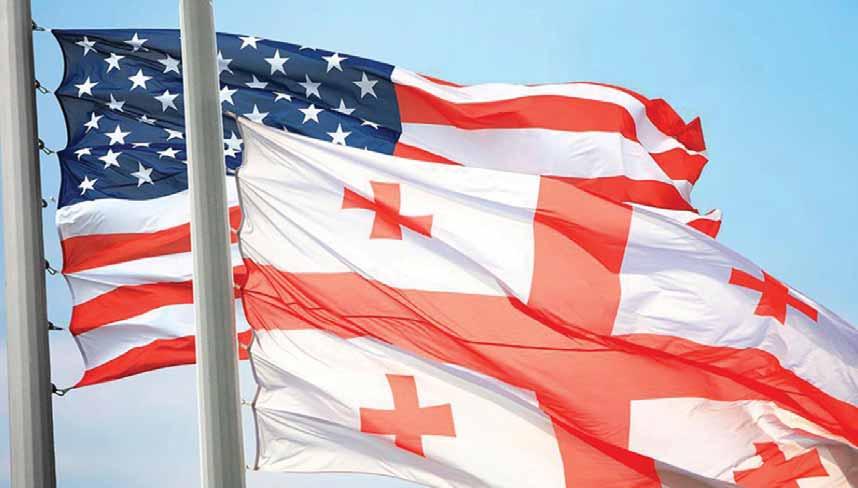 BY GIORGI TSIKOLIA
BY GIORGI TSIKOLIA
Until recently, the Caspian and Black Seas region played a limited role in geopolitics as a trade, energy, and infrastructure corridor. In February 2022, Russia’s invasion of Ukraine incited the international business community to bypass Russia by investing in new trade routes along the Caucasus and Central Asia. However, ongoing local conflicts throughout the Caspian and Black Seas region and the Middle East risk further destabilizing the countries around the seas.
With shared national interests in a secure and stable Caspian and Black Sea region, Georgia is a critical partner of the United States in promoting peace, economic development, and stability. Yet, a deeper partnership between the two countries is necessary to counter the coercive actions of regional malign actors, promote regional integration, and further economic development. Enhancing U.S.-Georgian relations in renewable energy, connectivity, security, and institutional capacity can improve regional peace and financial wellbeing.
THE REGION TODAY
The Caspian and Black Sea region borders Iran and Turkey to the south and Russia to the north, connecting the resource-rich Caspian basin to the European market. Since the 1990s, the United States has supported the construction of oil and gas pipelines running from the Caspian through Georgia. Since Russia invaded Ukraine, these pipelines have provided an alternative to Russian energy sources, along with the Middle Corridor trade route that connects China and Europe.
A series of military conflicts between Azerbaijan and Armenia from 2021–2023 has contributed to the destabilization of the region. Moreover, since the 2008 August War between Russia and Georgia, Russia has continued to occupy 20 percent of Georgia’s territory, with military strongholds in the Abkhazia and the Tskhinvali regions. Israel's war against Hamas also risks drawing in Iran, which could extend the regional conflict to Armenia and Azerbaijan's borders.
The region has three NATO countries: Bulgaria, Romania, and Turkey. Bulgaria and Romania are also European Union (EU) member states. Georgia, Ukraine, and Moldova are close Western partners that seek EU membership. Recently, the European Commission granted EU member candidate status to Georgia, bringing
the country closer to its path to EU integration.
Over the past three decades, the United States and Georgia have maintained a strategic partnership in various areas, including security, economics, democracy building, and people-to-people relations. Georgia provided the biggest per capita contribution of foreign troops to the United States’ war on terrorism, with 40,000 Georgians serving in Iraq and Afghanistan over the past two decades. In August 2022, when the United States requested assistance, Georgia provided security and shelter to U.S. government employees and their families departing Afghanistan.
The countries are also united in their opposition to Russian aggression and expansionism. For example, the United States has shown consistent support for Georgia's policy of de-occupation and peaceful reconciliation of the Georgian regions of Abkhazia and Tskhinvali. In 2017, the U.S. Congress also designated Abkhazia and Tskhinvali as Russianoccupied territories, prohibiting U.S. economic activity in those areas.
The United States has consistently prioritized its relationship with Georgia, investing significant time, political capital, and resources to strengthen its ties. For example, Georgia is one of the largest per capita recipients of U.S. financial assistance in the world. This aid has helped build state institutions, enhance security, increase economic resilience, and improve the rule of law. With these improvements, Georgia is progressing toward becoming a full-fledged member of the EU and NATO.
U.S. Ambassador to Georgia Robin L. Dunnigan arrived in Tbilisi in October 2023 with a message of positivity. During the hearing at the Parliament of Georgia in February 2024, she emphasized the importance of the U.S.-Georgia bilateral relationship and expressed her desire to deepen the partnership. However, Ambassador Dunnigan faces a daunting task ahead. Despite the historically productive partnership, limited connectivity, regional turbulence, geopolitical priorities, and geography have hindered progress toward greater integration between the United States and Georgia.
Additionally, the Russian occupation forces’ killing of Georgian citizen Tamaz Ginturi in November of 2023 is a stark reminder of the ramifications of the ille-
gal Russian occupation of Georgian territories. Arguably, no U.S. ambassador to Georgia has started their tenure in such challenging circumstances in the last thirty years. For U.S.-Georgian relations to fulfill their potential, I provide several suggestions:
Since signing the bilateral strategic agreement in 2009, working group meetings with Georgian and U.S. representatives have proven essential for policy formulation and relationship building. These meetings with senior government representatives cover democracy, security, economy, and people-to-people relations. They provide a roadmap for future actions, oversight, and progress analysis. Resuming working group meetings will enable diplomats and participating officials to rebuild personal ties, foster understanding, and develop a viable agenda for 2024 and beyond.
Senators Jeanne Shaheen, a Democrat from New Hampshire, and Mitt Romney, a Republican from Utah, have led a bipartisan effort in the U.S. Senate to establish a new strategy for the Black Sea region. The U.S. Department of State has also submitted a report that outlines the United States’ vision for a secure, prosperous, democratic, and globally connected Black Sea. These documents should serve as a blueprint for future collaboration, providing Georgian policymakers, academics, and businesses with a long-term understanding of U.S. interests and policies. On the U.S. side, allocating specific funds to enhance Georgia's economy and fund key infrastructure projects like the Black Sea undersea electricity cable will boost trust and signal commitment.
Advancing peace and stability in the Caspian and Black Sea region aligns with U.S. national interests. The U.S. government has increased its involvement in conflict resolution efforts between Azerbaijan and Armenia, including by hosting meetings in Washington and Munich with high-level officials from Armenia and Azerbaijan. Georgia has shown willingness and ability to support this process, which could prove instrumental in developing creative strategies for regional peace. Georgia’s support can also alleviate the strain on U.S. resources by helping U.S. officials understand the complexities of regional politics while
approaches to global trade have impeded a free trade agreement. In the short term, a viable solution could be sector-based agreements that could increase the institutional capacity of Georgian government agencies. In particular, the digital economy, energy, and manufacturing industries could catalyze the integration. Separately, the U.S. House of Representatives will soon debate extending the Generalized System of Preferences (GSP) trade program for participant countries. The GSP program allows participant countries, including Georgia, to export certain products to the United States without U.S. tariffs. Including Georgian wine, spirits, and steel products in this program would be a welcome message for Georgia’s small and mediumsized companies. Taking steps toward trade liberalization will increase the trade volume between the two countries, promote commerce, and create jobs.
remaining attuned to actions on the ground.
The U.S. International Development Finance Corporation's (DFC) investments in Georgia have played a significant role in rebuilding industries, creating jobs, and connecting the South Caucasus with global markets. In fall 2020, DFC announced a potential new regional office in Tbilisi. If opened, Georgia would be one of the few countries globally with a representative office of the largest U.S. government agency for development and investment. However, after the change in U.S. administration in 2021, the new DFC leadership paused the process due to an ongoing strategic overview, and a decision is still pending. A regional office would send Georgia a strong message of continuous U.S. support. Furthermore, with the possibility of peace between Azerbaijan and Armenia, a regional DFC office would augment the United States’ ability to influence regional economic integration processes.
Georgia and the United States have discussed the possibility of opening negotiations on a free trade agreement for more than a decade. Despite some progress, shifts in U.S. leadership and
Before the pandemic, the U.S. and Georgian governments supported starting direct commercial flights between the two countries. In September 2019, a delegation of high-ranking Georgian government officials visited the United States to meet with executives from the three major airlines to explore this possibility. Although the pandemic disrupted this process, the U.S. embassy in Georgia could again offer guidance to their Georgian colleagues to resume discussions. Senior members of the Georgian government could then travel to Washington to meet with U.S. airline executives, the U.S. Department of Commerce, the U.S. Trade Representative, and the Federal Aviation Administration. Direct flights between the two countries could reduce transaction costs for U.S. companies conducting business in Georgia and facilitate stronger people-to-people relations.
The United States and Georgia are committed to promoting a world order based on rules, respect for state sovereignty, and territorial integrity. Georgia's location as the southernmost link in the EuroAtlantic security architecture makes it a crucial partner for the United States. Since gaining independence, Georgia has found no better ally than the United States in its aspiration to become a member of the family of free and democratic nations. Therefore, it is now more critical than ever for Georgia and the United States to take their partnership to a new level.
Meeting with the US Secretary of State is by Georgian Government and is licensed under CC BY-NC-SA 2.0.
Source: fletcherforum.org
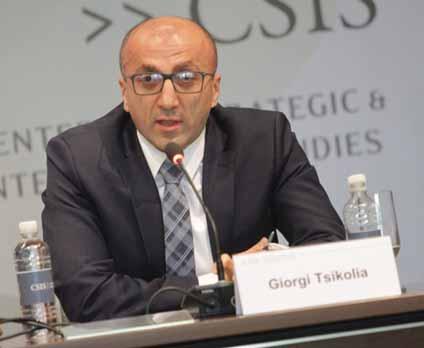
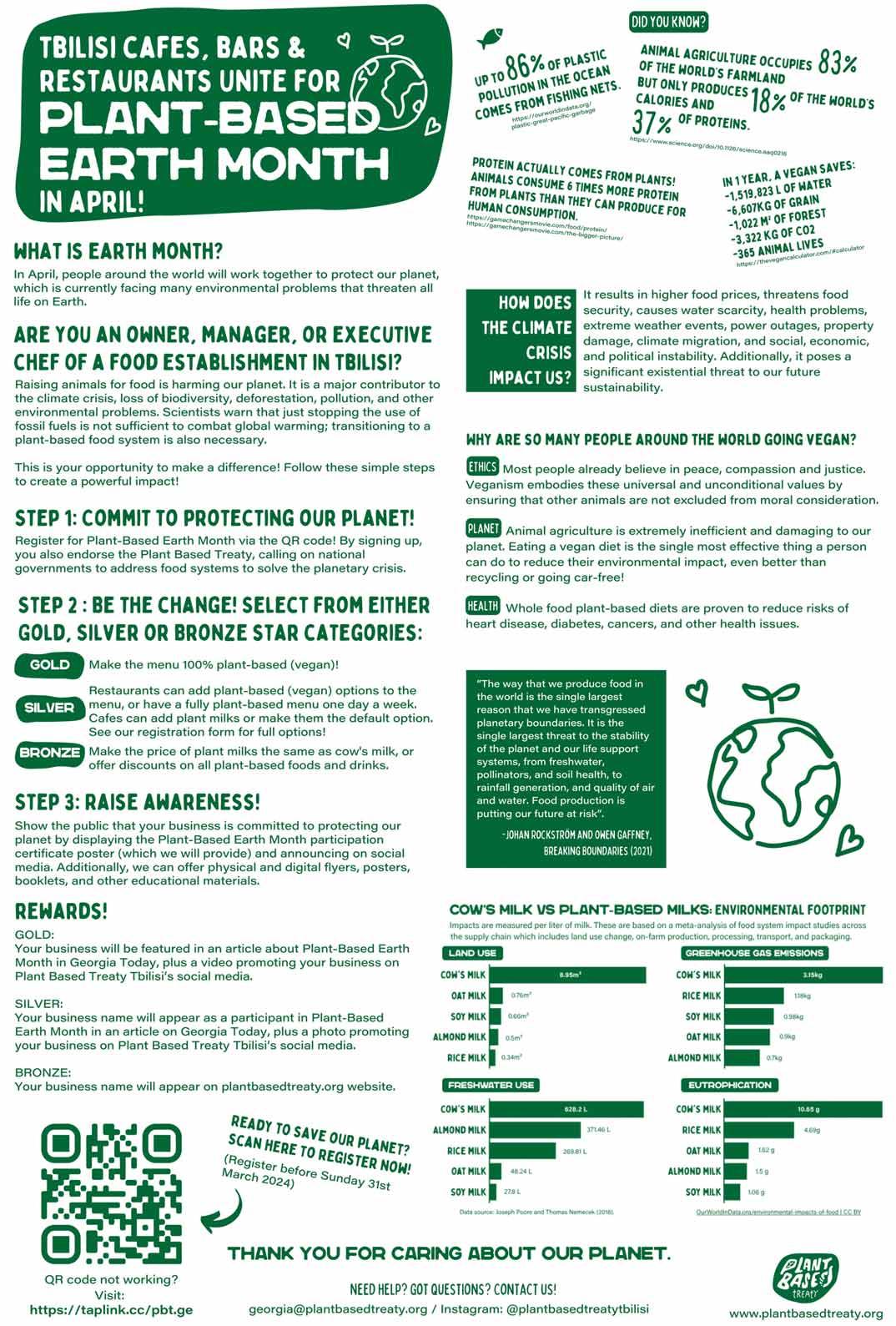

In today’s busy world, taking care of our health is crucial, and the wellness industry plays a big role in helping us to achieve the necessary balance. Taking care of ourselves can be extremely difficult considering our busy schedules and the constant stress from work, leading to us suffering from various diseases, aches and pains.
However, no matter how busy we are, we must try to allocate some time to take care of ourselves.
For those seeking perfect relaxation and an amazing healing experience in Georgia, the must-visit place is Hedone, a happiness hub in the heart of the country. Born from the idea of combating mental health issues during the pandemic, Hedone has become a wellness spot that
goes beyond the usual expectations. This is a place that brings harmony to your mind, body and soul.
There is a wide range of procedures available at Hedone, including massages, healing therapies led by skilled physiotherapists, and advanced facial skin care using French and Spanish products. They also offer urological and aesthetic procedures, diode epilation with a mod-

ern German device, fitness exercises, yoga, salon services, and a bar with refreshing and alcoholic drinks. In short, Hedone covers all aspects of wellness. Arrange for yourself a few hours of relaxation, and enjoy Hedone's unique healing relaxation procedures!
Hedone's services include the following: Medical treatment:
• Medical - healing massage
• Complex treatment procedure
• Therapeutic exercise
• Electro-physiological procedure
• Neurosedative head and neck massage
• Swedish massage
The program includes:
• Consultation
• Medical-healing massage
• Point, linear, deep-tissue post-isometric relaxation
• Kinesiotherapy (special exercises)

• Electro-physiotherapy
• Methods are based on scientific research and are tailored to individual needs.
The treatment program is led by professional rehabilitation doctors, manual therapy (chiropractic) and physiotherapy specialists.
"I have been serving this field for 25 years, and the more time that passes, the more I realize that manual therapy is an activity that keeps me wanting to make people feel better," says Artyom Afinyan, doctor-rehabilitologist, manualist.
“Nowadays, everyone has to work in a stressful and busy mode, and most of these people suffer from neck, back, spine and joint pain. I am glad that every year the number of people who trust me is increasing, and I am also happy when I see a recovering patient,” he adds. Trust the professionals – you deserve it!
Aka Morchiladze is making waves in Georgia’s literary field with his recently acclaimed nomination for a Nobel Prize in Literature, though he is typically modest about the fact. Those wanting to catch a glimpse of Georgia’s quiet literary star can do so at one of his two upcoming appearances in London, where he will talk about his recent English book ‘Character in Georgia,’ among other topics.
Morchiladze was named a candidate for the 2024 Nobel Prize last month, the results of which will be announced mid-October. The writer, who seldom makes public appearances, has agreed to do two presentations in the United Kingdom, one of which is in London on March 20. The interviewer and organizer of the event is Peter Nasmyth, a board member of the British Georgian Society in London and the co-author of ‘Character in Georgia.’ Morchiladze was born in Tbilisi in 1966. He is considered one of Georgia’s best contemporary writers and has lived in London for many years, where he continues to write about his homeland. He has won various awards and many of his books have been adapted for the screen.
Indeed, he has written over 20 novels, and aside from being an author, he also holds the title of historian and hosts a Georgian television show that highlights the country’s cultural heritage. The main topic of the March 20 event is Morchiladze’s recent book, and it will be held in one of London’s greatest literary venues, where both Charles Dickens and Charles Darwin were members – the

Aka Morchiladze. Source: 1tv
Athenaeum Club. The club was founded in 1824 and holds around 2,000 members, who come from a range of backgrounds, including literature and arts, law, science, and technology. The venue seeks to be a space for individuals to share ideas, conduct research, listen to talks, and to serve as a communal spot. Since the space is full of walls adorned with books and elegant chambers, it was decided as the ideal place for Morchiladze’s talk.
When GEORGIA TODAY attempted
to reach out to Morchiladze for a comment regarding his recent Nobel nomination, Nasmyth wrote on his behalf.
"I think I know what he will say - as he wrote to me the other day that he 'questions his deservedness' for the prize, which is typically self-effacing and modest of him. Most of us believe that he is Georgia's best chance at the moment."
Educator Tamuna Khasia has been working at 51st Public School in Tbilisi for the last 15 years, where she teaches Georgian literature. When she was a
student at the Ivane Javakhishvili University, she studied Eastern World Culture and History and was lucky enough to have Morchiladze as one of her lecturers. At that time, she knew him by his actual name: Giorgi Akhvlediani. Khasia said that while she was a student, he wasn’t a writer yet, as it was only in the 1990s and 2000s that he started publishing his work. However, every time she read one of his pieces, she tells us, she got the impression that she was directly listening to his voice. She
explained that it is clear how knowledgeable he is, because he has such a gift for intertwining Georgian history and literature.
According to Khasia, Morchiladze being nominated for a Nobel Prize gives great recognition to Georgia. Khasia says that even if he does not win, ‘May God let him get it’, the world will still be drawn to and know more about the nation of Georgia.
“We are a very small country, and every kind of success in any kind of competition, even those that may not be important for big countries, is good for our beliefs and self-confidence - that this small nation represents something,” said Khasia. “You can always see [Morchiladze’s] heart through his texts, the problems in Georgia are like wounds to him.” During soviet times, when communism dominated the region and people were restricted in what they could do, literature was still being written and creative methods were still practiced. Khasia tells us that if people can create and make things during a time like that, then “imagine what Georgian people can do in a free world.”
“There will be generations upon generations who will create writings, and thanks to the country gaining recognition, it will be easier and more accessible to write pieces in the future,” she says.
Those who attend the event in London on March 20 must adhere to the Athenaeum Club’s smart dress code of no trainers, denim, or sports clothing, and males are asked to wear ties. The talk will be held in the Smoking Room and will start at 7pm. It will last around 2.5 hours, followed by a wine reception. The cost of one ticket is 17 GBP.

Chinese cuisine and its delicacies are very popular among the Georgian gourmands. However, it’s not always easy to choose the right place to head to for authentic traditional Chinese dishes prepared with professionalism and care.
For those looking for original Chinese spirit and the chance to enjoy quality service along with extremely tasty delicacies, Ensemble restaurant, on the second floor of Hotels & Preference Hualing Tbilisi, is a must-visit.
Ensemble Restaurant offers 100 authentic dishes from different regions of China, boasting a unique culinary experience with the presence of 8 Chinese chefs specially brought in, each adding their expertise to create an authentic and exceptional dining journey.
The restaurant offers its guests five private rooms for maximum comfort, seamlessly designed for both meetings and dining, offering an exclusive ambiance for intimate gatherings and exquisite culinary experiences.
Notably, in 2023, Ensemble Restaurant was named the winner of the World Luxury Restaurant Awards in 2 categories: Authentic Cuisine: Country, and Chinese Cuisine: Regional. This award is yet another recognition of the dedication and professionalism of the Ensemble team, and appreciation of their passion to gift their guests unforgettable moments.
To find out more about the restaurant’s culinary traditions and its exciting offers, GEORGIA TODAY spoke to its manager, Rocky Wang, who revealed many exciting things and novelties about Ensemble restaurant, and Chinese culinary traditions in general.
PLEASE TELL US ABOUT YOUR PROFESSIONAL EXPERIENCE, PRIOR WORKPLACES AND WHY YOU CAME TO GEORGIA.
I graduated from Svenska För invandrae skolan in Karlstad, Sweden, in 2017. Following my education, I embarked on a fulfilling career journey. From June 2012 to October 2020, I owned and operated Restaurant Nya Peking in Karlstad, Sweden, renowned as the premier Chinese restaurant in the city.
diversity, incorporating a wide array of ingredients such as rice, noodles, vegetables, meats, and seafood. Bold and varied flavors are achieved through the use of ingredients like soy sauce, ginger, garlic, and an assortment of spices. Cooking techniques range from stir-frying and steaming to deep-frying and braising, offering a plethora of textures and flavors.
On the other hand, Georgian cuisine is characterized by its rich and aromatic flavors, often accentuated by the use of walnuts, pomegranates, and unique herbs. The emphasis is on hearty dishes featuring meats like lamb and poultry, complemented by flavorful sauces and spices. Cooking methods typically involve grilling meats and baking bread in traditional clay ovens, adding depth and complexity to the dishes.
Despite these differences, there are some potential similarities between the two cuisines. Both Chinese and Georgian cuisines feature variations of dumplings, such as dim sum in China and Khinkali in Georgia, showcasing a shared love for stuffed dough. Additionally, both culinary traditions prioritize the use of fresh, seasonal produce and exhibit regional variation, with different provinces in China and regions in Georgia boasting their own specialties and cooking styles. Furthermore, rice and grains serve as staple foods in both cuisines, albeit with variations in types and preparation methods.
CHINESE CUISINE IS VERY POPULAR IN GEORGIA. WHICH DISH (DISHES) OFFERED AT ENSEMBLE RESTAURANT ARE AMONG VISITOR FAVORITES?

WHAT ABOUT THE CHEFS PREPARING THOSE DELICACIES AND THEIR EXPERIENCE? ARE ALL OF THEM FROM CHINA?
Yes, our chefs at Ensemble restaurant are all from Guangdong, China, bringing years of experience in Cantonese cuisine from esteemed hotels across China. Their expertise ensures that every delicacy prepared at our restaurant maintains an authentic and high-quality taste that delights our customers.
ALONG WITH DELICIOUS DISHES, THE GENERAL ENVIRONMENT IS ALSO IMPORTANT. TELL US ABOUT THE INTERIOR AND DECORATIONS OF THE RESTAURANT.
privacy, making them perfect for intimate gatherings, whether it's a cozy get-together with friends and family or a formal business banquet. The seamless design ensures that guests can enjoy their dining experience in a comfortable and exclusive environment, enhancing the overall enjoyment of their visit to our restaurant.
TO CONCLUDE, WHAT MAKES ENSEMBLE RESTAURANT DISTINGUISHED FROM OTHER CHINESE RESTAURANTS IN TBILISI?
In November 2020, I transitioned to a new role as the Director of Food & Beverage at Expo Hot Spring Hotel in Beijing, a prestigious 5-star establishment. Overseeing various departments including F&B Sales, Banquet Service, Chinese & Western Restaurants, and more, I contributed to the hotel's success in catering to both local and international guests.
Now, I've found my way to Georgia, attracted by its vibrant culinary scene and welcoming atmosphere. I was appointed as the manager of this restaurant in 2023, and I've been proud to call Georgia home since then, bringing my wealth of experience to contribute to the hospitality industry here.
TELL US ABOUT SOME EXCITING CHINESE CULINARY TRADITIONS. WHAT DISTINGUISHES IT FROM OTHERS WORLDWIDE AND WHY DOES IT ATTRACT GOURMANDS SO MUCH?
Cantonese cuisine stands out among the world's culinary traditions for its rich heritage and meticulous preparation techniques. As one of the eight major Chinese cuisines, it blends the essence of Guangzhou, Chaozhou, Dongjiang Hakka cuisine, and more.
What distinguishes Cantonese cuisine is its emphasis on knife work, showcasing intricate cutting skills that enhance the visual appeal and texture of the dishes. Moreover, Cantonese cuisine is known for its diverse and abundant ingredients, ranging from seafood delicacies like shark fins, abalone, and sea cucumber to fresh river fish and jellyfish.
A hallmark of Cantonese cooking is its commitment to preserving the original flavors of ingredients, often showcased through slow-cooked soups, braised dishes, and stews.
HOW DIFFERENT IS CHINESE CUISINE FROM GEORGIAN?
WHAT ARE SOME SIMILARITIES?
From a culinary perspective, Chinese and Georgian cuisines showcase distinct characteristics shaped by their respective cultural backgrounds and regional influences.
Chinese cuisine is renowned for its
Chinese cuisine enjoys popularity in Georgia, with several dishes at Ensemble restaurant standing out as visitor favorites. Among the offerings, the roasted duck with sweet and chili sauce tends to be a top choice for many patrons. The succulent duck, roasted to perfection and served with a delectable sweet and spicy sauce, captivates diners with its irresistible flavors.
Additionally, the shrimps with garlic on an iron skillet garner significant attention from visitors. This dish features plump and juicy shrimps cooked to perfection on a sizzling iron plate, infused with aromatic garlic flavors that tantalize the taste buds.
Another popular option is the fried beef with green and jade sauce. Tender beef slices are stir-fried with vibrant green vegetables and a savory jade sauce, creating a harmonious blend of flavors and textures that delights diners.
Lastly, the roasted Cantonese egg tart is a favorite dessert choice among patrons. With its flaky pastry crust and rich, creamy custard filling, this traditional Cantonese delicacy offers a delightful conclusion to a satisfying meal at Ensemble restaurant.
TELL US MORE ABOUT THE MENU AND YOUR SIGNATURE DISHES.
Our menu at Ensemble restaurant features an array of signature dishes that highlight the diverse flavors and culinary excellence of Chinese cuisine. Among these standout offerings are the Xinjiang spicy chicken, renowned for its bold and aromatic spices that create a tantalizing flavor experience.
Additionally, our selection of stir-fried noodles encompasses a variety of options, each crafted with precision and attention to detail. From classic favorites to innovative creations, our stir-fried noodles showcase the versatility and richness of Chinese culinary traditions, satisfying the cravings of discerning diners.
These signature dishes exemplify our commitment to delivering exceptional dining experiences, with flavors that leave a lasting impression on every palate.
Our restaurant boasts a traditional Chinese architectural design, creating an ambiance that immerses diners in an authentic cultural experience. With seating for up to 120 guests, including five separate private rooms, each named after a major city in China, we offer a comfortable and intimate setting for patrons to enjoy their dining experience.
THE RESTAURANT HAS FIVE PRIVATE ROOMS, SEAMLESSLY DESIGNED FOR BOTH MEETINGS AND DINING. TELL US MORE ABOUT THEM.
Our five private rooms are meticulously designed to provide an ideal setting for various occasions, blending functionality with elegance. Each room offers excellent
Ensemble restaurant stands out among other Chinese restaurants in Tbilisi for several reasons. Firstly, our restaurant boasts superb upscale decor, creating an ambiance that exudes elegance and sophistication. Secondly, we pride ourselves on serving authentic traditional Chinese cuisine, prepared by experienced chefs from Guangdong, China, ensuring that every dish captures the true essence of Chinese culinary traditions. Lastly, as the largest Chinese restaurant in Tbilisi, we offer ample seating and spacious dining areas, providing our guests with a comfortable and enjoyable dining experience. These distinctive features combine to make Ensemble restaurant a premier destination for those seeking an unparalleled Chinese dining experience in the heart of Tbilisi.
It blends Xinjiang delicacies with the exquisite flavors of Cantonese and Sichuan cuisine, creating a diverse tapestry of tastes to indulge every palate.


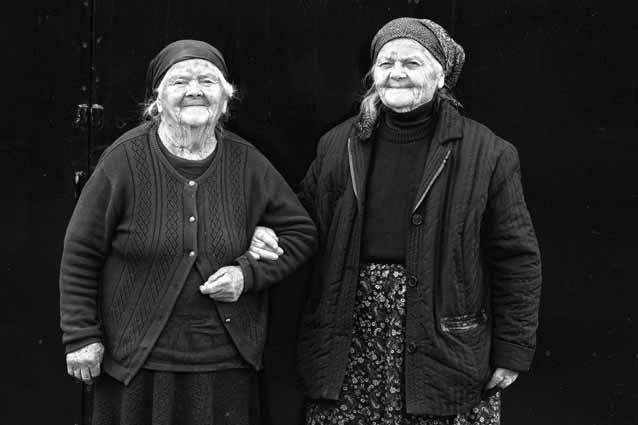
Afriend recently lost his mother in Kakheti, so my wife and I came here for the funeral. Then we added some extra days to be with her elderly mother and her sister.
Georgia’s main grape-growing region had a mild winter and is now gearing up for spring. Many plants are already putting forth new leaves. Some orchards, particularly of peach trees, have started blossoming. People have been pruning their grapevines, then tying them back onto the horizontal wires from which they will continue to grow all summer long, until the glorious rtveli, or autumn harvest.
One can either use cheap string to do the vine-tying… or use what you have on hand, which is free and 100% natural. In this case, the material is leaves from corn husks. You would feed these to your ruminant livestock if you had any, but we don’t. So you tie up the vines with them, which also looks much prettier and more natural anyway. I alternate between a 10-18mm lens for the wide scene, and a 90mm macro lens to find smaller parts, even 1:1 close-ups if I want them. It took a few days of varied weather before the long stretch of Caucasus mountains north of us performed its floating illusion. Yesterday, the hazy lower mountain heights and the sky above them reached exactly the same hue, making it look as though the white snowy layer in between the two is hovering in midair. I drove around looking
for a good location to shoot a long stitched panorama of this scene, unencumbered by a foreground mess of electrical wires and so on.
My final stop of three attempts was at a gravel works, where rocks are being turned into smaller stones for concrete work. The foreman drove me up a small hill they had made for one of the conveyor belts, and from here I got 14 frames. I’m still working on this image on my laptop; it takes 20 minutes or so just to save because it’s such a big file. I normally don’t bother using a tripod, just letting the camera frame’s guide grid help me keep my images in roughly a straight line, and overlapping enough to stitch together.
I also took my wife and her mother and sister into one of the nearby towns for some banking and shopping, and on the
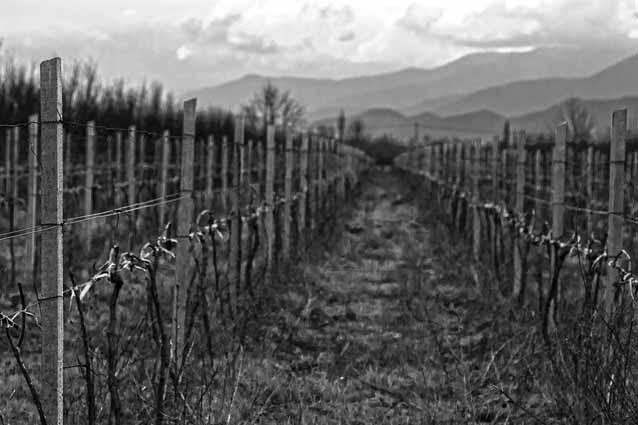


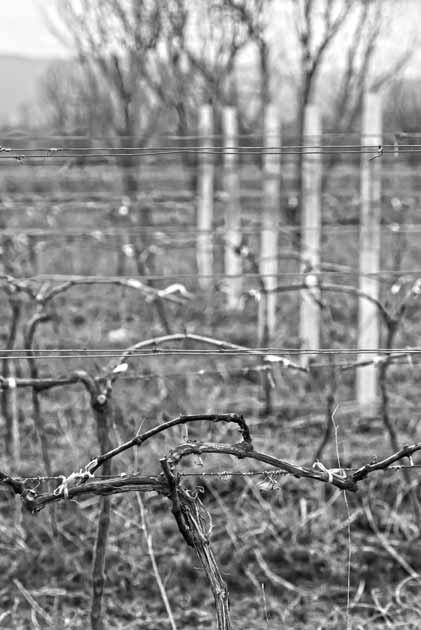
way home we stopped at the former’s sister’s house to catch up and have lunch. I used the opportunity to photograph these two ladies in their mid-80s together, the last of their sibling set, because who knows how long we will have them with us? Reluctant apart, they let me shoot as a pair, and I got what I wanted. The mostly overcast skies eliminate hard contrast from shadows, and give more saturation and detail. I still find myself processing most of my images into black and white, though, preferring the look, undistracted by any color at all.
As I always do on these visits to now familiar territory in eastern Georgia, I have been looking for the little details
which other people might live with and become so used to that they don’t notice them anymore. Whatever the season, there is plenty to draw the eye if it’s alert and on the lookout. Does that sound like a cliché? It’s my modus operandi.
Tony Hanmer has lived in Georgia since 1999, in Svaneti since 2007, and been a weekly writer and photographer for GT since early 2011. He runs the “Svaneti Renaissance” Facebook group, now with over 2000 members, at www.facebook.com/groups/ SvanetiRenaissance/ He and his wife also run their own guest house in Etseri: www.facebook.com/hanmer.house.svaneti
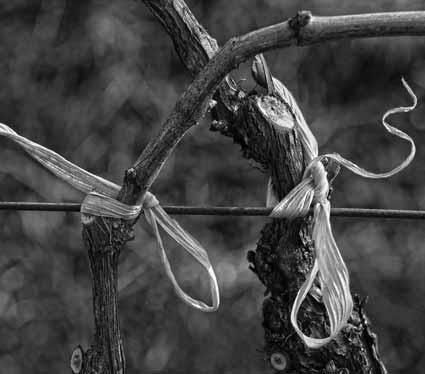




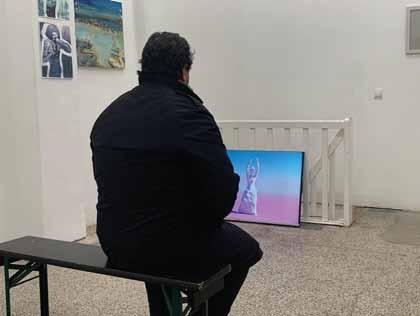 REVIEW BY LILY FÜRSTENOW
REVIEW BY LILY FÜRSTENOW
In his evocative cycle of paintings, Georgian artist Guga Kakabadze represents the recurrent motive of old-fashioned gates and doors crafted from heavy wood and intricate paneling. These take center stage in his newest paintings, their polished surfaces bearing the marks of time and history. Each door is adorned with heavy metal locks, their gleaming forms matching with aged wood. Nearby, chests of drawers with locks stand sentinel, their imposing presence hinting at secrets and imaginary treasures hidden within. Through the artist's skillful rendering, these common parts of interiors become more than mere architectural features— they are symbols of mystery, nostalgia, and the passage of time.
Guga Kakabadze's paintings are masterfully crafted, the artist's skill in realistically capturing the intricate wood structure and shadows of the locks imbues each scene with a palpable sense of realism. Every knot, grain, and pattern of wood panelling is meticulously rendered, giving a tactile sensation that transports viewers into the heart of the scene. The shadows cast by the heavy metal locks play across the wood's surface with precision and nuance, creating an illusion of depth that makes it appear as if one could reach out and touch the rugged texture. In some works, faint sunlight creeps into the scenery, adding to the mysterious aura. Through the artist's craftsmanship, his use of trompe l'oueil technique and reduced color palette of light and darker hues of brown invite us to linger, wondering if it is any good at all to keep knocking at closed doors. The locked gates leave the mysteries behind them veiled.
Kakabadze's windmill and edifice paintings series investigates abandoned landscapes, with towering buildings and windmills placed in the center of the composition. Painted in hues of white, against ominous orange backgrounds their weathered wings look as if spin-
ning lazily in the breeze. Architecture acquires here symbolic meaning: e.g. windmills recall Don Quixote's vain and senseless fights with windmills, whereas anthropomorphic buildings get a surreal touch reminding us of sad faces and crouched human figures. Delapidated edifices loom like ancient guardians, their crumbling facades lending an air of mystery and intrigue to the scene. Rendered with a dreamlike quality, the landscape takes on an otherworldly aura,
as if plucked from the realms of fantasy and surrealism. Amidst these haunting tableaus, a tiny man figure emerges as a signature recurring motif, a solitary wanderer navigating the vast expanse of the abandoned terrain. Through the artist's skillful rendering, these scenes open up a realm where reality blurs with imagination, revealing the hidden depths of the subconscious.
The works are on view at the local community center Nachbarschaftszentrum Brunnentreff of the Volkssolidarität Berlin, as part of the Art in Public Spaces Project, an intervention inviting international artists to show their works in the city center. It takes place not far from the famous Berlin Wall Memorial, in the newly upgraded hipster part of the Brunnenstrasse, where many of the former dwellers of the GDR had to leave due to sky-rocketing apartment rent and gentrification.
Another exhibition worth mentioning in this context, currently on in Hamburg, is dedicated to the ancient myth of antiquity – Medea, and takes place in the hinterconti artist-run space. Entitled "Medea's Daughters. Eternity Is a Lie," it focuses on the feminist artistic positions and offers an unconventional interpretation of this centuries-old legend.
The aim of the project is to subvert and critically inquire of patriarchal narratives and representations of women in art historical canon, visually analyzing the protagonists of the ancient myth from the perspective of the female gaze.

PUBLISHER & GM
George Sharashidze
COMMERCIAL DEPARTMENT
Commercial Director: Iva Merabishvili
Marketing Manager: Natalia Chikvaidze
EDITORIAL DEPARTMENT:
Editor-In-Chief: Katie Ruth Davies
Journalists: Ana Dumbadze, Vazha Tavberidze, Tony Hanmer, Nugzar B. Ruhadze, Mariam Mtivlishvili, Erekle Poladishvili, Shelbi R. Ankiewicz
Photographer: Aleksei Serov

Questioned is also the notion of eternity, as something imposed on one as a burden, a method of oppression and an unrealistic utopia. Realised in cooperation with hinterconti Hamburg, this exhibition is one of the unique shows that, among others, brings up the discourse about the two versions of the Medea myth - one commonly known in Georgia through folklore and oral literary tradition, and the other widely accepted in the West based on the classical Greek tragedy of Medea by Euripides. Eleven Georgian women artists and one artist from Frankfurt each render their view and understanding of Medea and her evolvement through time. In what way is Medea relevant to us today?
Interestingly enough, according to Georgian folklore, Medea was the daughter of Aieti, King of Colchis - an antique kingdom that included the territories of the current Western Georgia, Abkhazia and parts of the Black Sea coast of the current Turkey. Colchis was famous for its mythic affluence, especially its main treasure - the Golden Fleece - that coveted object of desire that made Jason and the Arganauts sail off from the Greek coasts to steal it. Medea, who fell madly in love with Jason, helped him in the theft, thus betraying her homeland. She had to flee together with Jason and her children to Greece, where she was in her turn betrayed by Jason, who left her for the princess of Corinth.
According to Levan Berdzenishvili, a researcher and expert on ancient history and literature, Medea didn't in fact kill her children out of jealousy. It was Euripides, who, inspired by the legend, made it into a tragedy. Medea went into history as the femme-fatale, an ominous murderer, leaving destruction and animosities behind her, whereas Jason remains the celebrated hero of impeccable reputation. Medea was never accepted by the
Greeks as an equal, since she was considered a barbarian coming from the land outside Corinth - most doors were closed to her as a foreigner. Prejudices, bias and envy keep many doors still closed to women, refugees, minorities or populations of geo-politically less relevant countries, like those of the former Soviet block, newly independent states whose full integration into cultural European community is a stagnating process - all of which brings us back to Guga Kakabadze’s locked gates and windmills. Yet not all doors are as closed as they seem; there is hope. Struggling for justice, equity, more rights and freedoms makes far more sense than hopeless fighting with windmills.
ABOUT HINTERCONTI
Hinterconti is an association of artists and cultural workers. As a non-profit association, its members have been regularly organizing exhibitions by national and international artists since 1999.
The focus of the exhibitions and projects is to offer artists a forum for their artistic practices. Hinterconti gives artists the space to develop their ideas, to outline questions, or to publicly show works in progress that will not necessarily be seen in the usual art market and exhibition context. The association operates with the kind support of the Authority for Culture and Media, Hamburg.
Both exhibitions in Berlin and in Hamburg are curated by myself, Lily Fürstenow. A curator's guide to "Medea's Daughters. Eternity Is a Lie" at hinterconti Hamburg is scheduled on the 16th and 17th of March, 3pm to 8pm. More details online: https://www.hinterconti. de/2024/02/medeas-daughters-eternityis-a-lie-curated-by-lily-fuerstenow-8-3-16-3/
Website Editor: Katie Ruth Davies
Layout: Misha Mchedlishvili
Webmaster: Sergey Gevenov
Circulation Managers: David Kerdikashvili, David Djandjgava
ADDRESS
1 Melikishvili Str.
Tbilisi, 0179, Georgia
Tel.: +995 32 229 59 19
E: info@georgiatoday.ge
F: GeorgiaToday
ADVERTISING &
+995 555 00 14 46
E-mail:
marketing@georgiatoday.ge
Reproducing
Reg.
